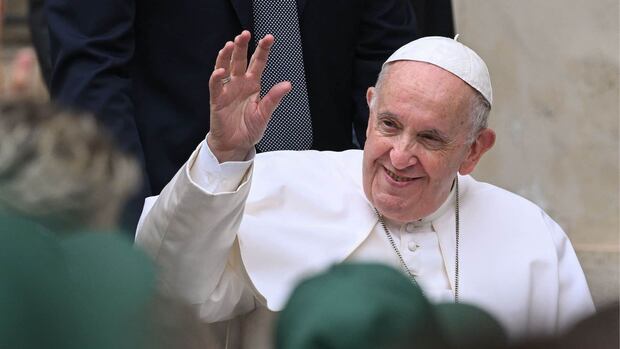Ottawa to fund travel for residential school survivors who want to see Pope Francis
Roman Catholic Churches in Canada will also help cover costs for survivors

The federal government is expected to soon announce funding for residential school survivors who want to attend the papal visit in-person or by holding their own community events, according to a senior government source.
The Vatican confirmed on Thursday that Pope Francis will still travel to Canada from July 24 to 29, despite ongoing health concerns over his knee.
The trip is focused on healing and reconciliation with First Nations, Inuit and Métis people for harm caused by the Roman Catholic Church's operation of government-funded residential schools.
The pontiff will also hold two large masses for the faithful in Edmonton's Commonwealth Stadium and at the Shrine of Sainte-Anne-de-Beaupré, about 33 km northeast of Quebec City.
A senior government source, who was not authorized to speak publicly, said plans are in the works to ensure funding is available to survivors who want to see Pope Francis, or hold their own viewing or community events to mark the historic occasion. The source said an announcement is expected within the next two weeks.
WATCH | The Vatican confirms papal visit to Canada is still on:
Crown-Indigenous Relations Minister Marc Miller said on Thursday he couldn't speak publicly about the amount of money the government will make available.
But he did say the government will be there for survivors to ensure they can participate.
"We'll be making sure they can do it in a way that doesn't cost them an arm and a leg," Miller said.
He noted the papal visit has the potential of becoming a "logistical nightmare" in the event elders are stranded at airports.
Other supports for survivors
The Government of Nunavut is covering the travel costs and accommodations for a small group of survivors for its part of the pope's visit to Iqaluit.
Premier P.J. Akeeagok's office told CBC News it is paying survivors consultation fees to take the lead and provide direction on how they would like to see the visit conducted.
Nunavut Inuit interested in going to the papal events are asked to register with Nunavut Tunngavik Incorporated (NTI), which is the entity charged with safeguarding Inuit rights under the Nunavut Agreement.
NTI is working with Inuit Tapariit Kanatami (ITK) and other Inuit regions on a plan to facilitate travel for Inuit and speak with Pope Francis.

ITK President Natan Obed told CBC News he hopes the Roman Catholic Church offers significant funds so residential school survivors can attend the papal visit. But he said Ottawa should also foot the bill.
"Both of those parties should be the parties responsible for travel considering both of those parties were responsible for the running of residential schools and the very reason why there is a need for an apology from the Catholic Church in the first place," Obed said.
Pope Francis is expected to deliver the first papal apology for residential schools on Canadian soil on July 25 when he visits the former Ermineskin Indian Residential School in Maskwacis, Alberta, which is located about 96 km south of Edmonton.

The church's role
Archbishop Richard Smith of Edmonton, who is leading plans for the papal visit, said financial support is something the church is looking at offering, but the details still need to be worked out at the local level among individual dioceses since there is no centralized Canadian Roman Catholic body.
"The church certainly does want to do its part," Smith said.
"The bishop in his diocese would know the survivors in that area. How can he work together with them? What are their needs?"
In a statement from the Canadian Conference of Catholic Bishops (CCCB), a spokesperson told CBC News some dioceses are providing funding to individual survivors while others are coordinating travel arrangements for large numbers of people to make a pilgrimage to the events.
The CCCB said local dioceses may also arrange community broadcast events for the papal visit.
The church is also raising money for the events on a website it created to promote the pope's trip to Canada.
Some First Nations, such as the McLeod Lake Indian Band, located approximately 920 km northeast of Vancouver, intend to cover the cost of travel and accommodations for their survivors.
The federal government is paying for the pope's security, since his trip is a state visit.
With files from the CBC's Julia Wong


